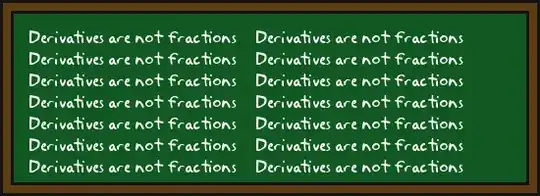$\mathbf{SHORT}$: what is the result of $\iint{d^2x}$? Does it make sense from a mathematical point of view? Please note that I am not refering to $\iint{dx^2}$.
$\mathbf{LONG}$
I came to this doubt while solving the differential equation of a LC circuit (voltage source, inductor, and capacitor in series).
$$V_{in}(t)=V_C(t) + V_L(t)=\frac{1}{C}\int{i(t)dt}+L\frac{di(t)}{dt}\tag{1}$$
Where $L$ and $C$ are the constants of the inductor and capacitor respectively. Assuming $V_{in}(t) = 0$, and differentiating respect to $t$ both sides we obtain: $$L\frac{d^2i(t)}{dt^2}+\frac{1}{C}i(t)=0$$
Or in standard differential equation form:
$$\frac{d^2i(t)}{dt^2}+\frac{1}{LC}i(t)=0$$
Now, I DO know how to solve this as a differential equation, that is not my doubt. However, alternatively, if I rearrange the terms: $$\frac{d^2i(t)}{i(t)}=-\frac{1}{LC}dt^2\tag{2}$$ $$\iint{\frac{d^2i(t)}{i(t)}}=-\frac{1}{LC}\iint{dt^2}=-\frac{1}{LC}\int{(t+C_1)dt}=-\frac{1}{LC}\left({\frac{t^2}{2}+C_1t+C_2}\right)\tag{3}$$
As you can see, the right part of $(3)$ can be easily solved since $\int{dx}=x$ and $\iint{dx^2}=\int{\left(\int{dx}\right)dx}$. However, when it comes to the left side of the equation, I don't know how to proceed. I have read somewhere that the term $d^2x$ does not make sense by itself, and that $\frac{d^2x}{dt^2}$ is just some form of notation to refer to $x''(t)$. But I don't buy it, because in the following case:
$$\frac{dx}{dt}=x$$
Solving this is as simple as multiplying both sides by $\frac{dt}{x}$ and integrating:
$$\int{\frac{dx}{x}}=\int{dt} \Rightarrow ln|x|=t+C_1 \Rightarrow x=x(t)=e^{t+C_1}$$
In this case, we did operate with the two terms $dx$ and $dt$ by considering them as differentials. Then, there must be a way I believe there might be a way of solving $\iint{d^2x}$, and consequently also $\iint{\frac{d^2x}{x}}$ as in equation $(3)$.
By the way, feedback on my question is happily accepted, since is my first question on math stackexchange.
